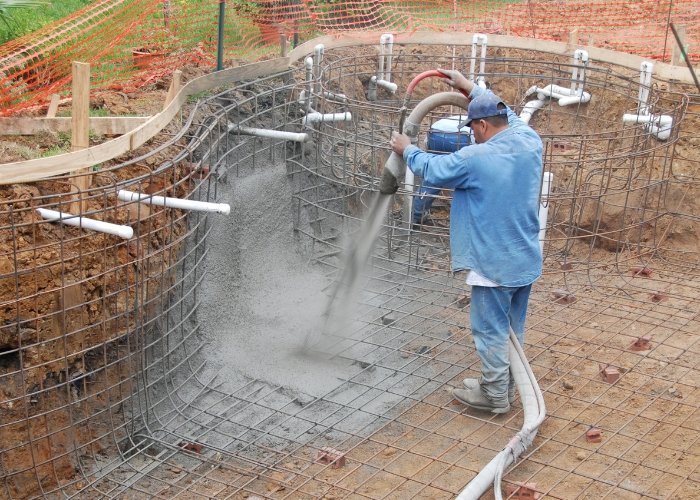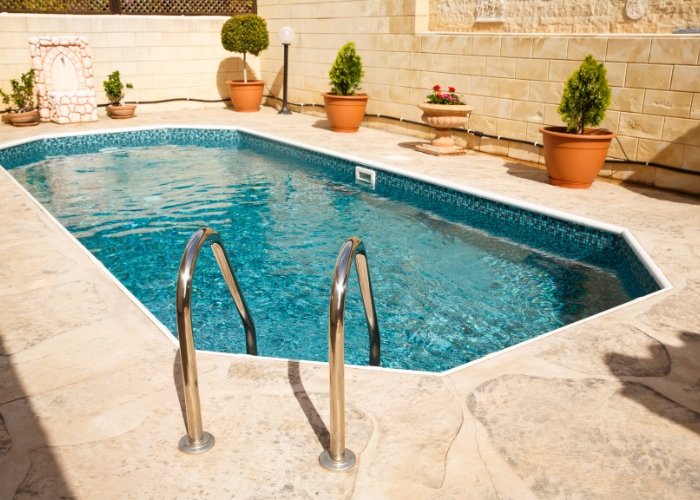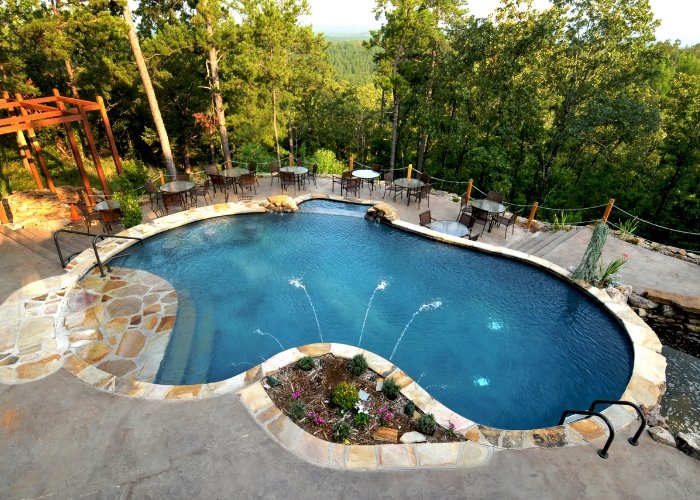Gunite vs. Fiberglass Pools: Making the Right Choice for Your Backyard
When you’re planning to install a swimming pool, one of the first major decisions you’ll need to make is choosing between a gunite or fiberglass pool. Both options have their strengths and drawbacks, and the best choice for you will depend on your specific needs, budget, and preferences. In this guide, we’ll break down the differences between gunite and fiberglass pools to help you decide which type is best suited for your backyard oasis.
Understanding Gunite Pools

What is a Gunite Pool?
A gunite pool is a type of inground pool constructed from a mixture of concrete and sand, which is sprayed onto a reinforced steel frame using high-pressure equipment. Once the gunite cures, it forms a strong and durable shell that can withstand significant wear and tear. Gunite pools are highly customizable, allowing you to create a pool that fits your exact specifications in terms of shape, size, and depth.
Advantages of Gunite Pools
- Unlimited Customization: Gunite pools offer endless possibilities in design. Whether you envision a simple rectangular pool or a complex, freeform shape with integrated features like waterfalls or spas, gunite can accommodate your vision.
- Durability: Gunite is known for its longevity. With proper care, a gunite pool can last 50 years or more, making it a long-term investment in your home.
- Aesthetic Versatility: You can choose from various finishes, such as plaster, tile, or pebble, to create a unique look that complements your landscape and personal style.
Drawbacks of Gunite Pools
- Cost: Gunite pools are generally more expensive than fiberglass pools, with prices typically ranging from $50,000 to $100,000 due to their custom-built nature.
- Maintenance: The porous surface of a gunite pool requires more maintenance, including frequent chemical treatments to prevent algae growth and staining.
- Installation Time: Building a gunite pool is a lengthy process, often taking several weeks to complete due to the on-site construction and curing time.
Understanding Fiberglass Pools

What is a Fiberglass Pool?
Fiberglass pools are pre-manufactured in a factory and delivered to your home as a single, ready-to-install shell. They come in standard shapes and sizes, which means they can be installed quickly and with minimal disruption to your property.
Advantages of Fiberglass Pools
- Quick Installation: One of the most significant benefits of fiberglass pools is the speed of installation. In many cases, a fiberglass pool can be installed in just a few days, allowing you to enjoy your pool sooner.
- Low Maintenance: The smooth, non-porous surface of fiberglass pools resists algae growth, requiring fewer chemicals and less frequent cleaning than gunite pools.
- Durability: While fiberglass pools may not offer the same level of customization as gunite, they are incredibly durable and can last for 20-30 years, with some lasting up to 50 years with proper care.
Drawbacks of Fiberglass Pools
- Limited Customization: Fiberglass pools are available in a range of standard shapes and sizes, but they lack the customization options of gunite pools. If you have a unique design in mind, a fiberglass pool may not meet your needs.
- Availability: Depending on your location, there may be limited availability of certain fiberglass pool models, which could delay the installation process.
- Potential Installation Flaws: Although installation is generally quick, it’s crucial to work with an experienced installer to avoid potential flaws, such as improper leveling, which could lead to long-term issues.
Cost Comparison
When it comes to cost, fiberglass pools are generally less expensive than gunite pools. The average cost of a fiberglass pool, including installation, ranges from $20,000 to $40,000, while gunite pools typically cost between $50,000 and $100,000 due to their custom-built nature.
Maintenance Comparison
Fiberglass pools are easier to maintain than gunite pools. The smooth surface of a fiberglass pool resists algae growth, reducing the need for frequent chemical treatments. Gunite pools, on the other hand, require more maintenance due to their porous surface, which can harbor algae and stains if not properly managed.
Installation Time Comparison
The installation time for a fiberglass pool is much shorter than for a gunite pool. Fiberglass pools can be installed in as little as one week since they are pre-manufactured and only require placement and connection on-site. In contrast, gunite pools are built on-site and can take several weeks to complete, including the time needed for the gunite to cure.
Lifespan Comparison
Both gunite and fiberglass pools are long-lasting, but they differ in maintenance needs over time. A fiberglass pool can last 20-30 years, and potentially up to 50 years, with minimal maintenance. Gunite pools also have a long lifespan, often lasting over 50 years, but they require resurfacing every 7-10 years to maintain their durability and appearance.
Design and Customization
If customization is your top priority, gunite pools are the clear winner. They can be molded into virtually any shape, size, or depth, making them ideal for homeowners with specific design visions. Fiberglass pools, while available in various standard designs, do not offer the same level of flexibility and are limited to the shapes and sizes provided by manufacturers.

Frequently Asked Questions (FAQs)
1. How long does it take to install a gunite pool?
Installing a gunite pool typically takes several weeks. The process involves custom designing the pool, constructing the steel framework, spraying the gunite, and allowing time for the material to cure. On average, the entire process can take 6 to 8 weeks, depending on the complexity of the design and weather conditions.
2. Are fiberglass pools more affordable than gunite pools?
Yes, fiberglass pools are generally more affordable than gunite pools. Fiberglass pools usually cost between $20,000 and $40,000, including installation, while gunite pools can range from $50,000 to $100,000. The higher cost of gunite pools is due to their custom-built nature and the extensive labor involved in their construction.
3. What kind of maintenance is required for a gunite pool?
Gunite pools require more maintenance than fiberglass pools due to their porous surface, which can harbor algae and stains. Regular maintenance includes balancing the pool’s chemicals, brushing the pool’s surface to prevent algae growth, and periodic resurfacing every 7 to 10 years to maintain the pool’s appearance and structural integrity.
4. Can a fiberglass pool be customized to any shape or size?
No, fiberglass pools cannot be customized to the same extent as gunite pools. Fiberglass pools are pre-manufactured in standard shapes and sizes. While there are a variety of designs available, they are limited to what the manufacturer offers. If you need a pool with a specific shape, depth, or unique features, a gunite pool would be a better option.
5. How long do fiberglass and gunite pools last?
Fiberglass pools typically last between 20 and 30 years, though they can last up to 50 years with proper care. Gunite pools are known for their durability and can last over 50 years; however, they do require resurfacing every 7 to 10 years to maintain their longevity and aesthetic appeal.
Which Pool is Right for You?
Choosing between a gunite and fiberglass pool depends on your individual needs and priorities. If you value complete customization, durability, and are willing to invest in long-term maintenance, a gunite pool may be the best choice for you. However, if you prefer a quicker installation, lower maintenance, and a more budget-friendly option, a fiberglass pool could be the ideal solution.
Whichever type of pool you choose, it’s essential to work with experienced professionals who can guide you through the process and ensure a successful installation. By making an informed decision, you can enjoy a beautiful and functional pool that enhances your backyard for years to come.

